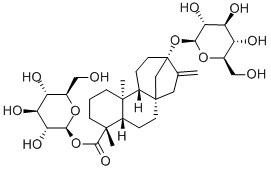In the quest for health and wellness, finding natural and nutritious alternatives to conventional products is becoming increasingly important. One such gem is Sweet Blackberry Leaf, Chinese sweet tea, or Tian-Cha (Rubus suavissimus S. Lee), a versatile plant that is making waves in the wellness community. This blog post explores the potential health benefits of Chinese sweet tea, using research published in Trends in Food Science & Technology.
Sweet Blackberry Leaf is a deciduous shrub native to the hills and slopes of Guangxi Province in southern China. The tea’s taste is smooth, fruity, and earthy. Its leaves are not only used to brew a delightful tea but also serve as a source of a natural sweetener called rubusoside.
Traditionally, Sweet Blackberry Leaves have been used for a sore throat, sore gums, and mouth ulcers. It is said to be high in vitamin C and antioxidants that help fight bacteria.
Rich Chemical Composition
The leaves of R. suavissimus are packed with various nutrients, including:
- Rubusoside: The main sweet component, known for its high sweetness and low-calorie content.
- Polyphenols: Compounds with antioxidant properties.
- Flavonoids: Known for their anti-inflammatory and anti-cancer benefits.
- Polysaccharides: Beneficial for immune health.
- Minerals and Amino Acids: Essential for overall health and well-being.
Potential Health Benefits of Chinese Sweet Tea
The rich chemical composition of Chinese sweet tea may translate into a myriad of health benefits, which are maximised when using the whole leaf. Here’s why:
- Anti-Inflammatory and Anti-Allergic Properties: The polyphenols and flavonoids in R. suavissimus may help reduce inflammation and alleviate allergic reactions, making it an excellent choice for individuals with chronic inflammatory conditions.
- Regulation of Glucose and Lipid Metabolism: Regular consumption of Chinese sweet tea may aid in maintaining healthy blood sugar and lipid levels, which is crucial for preventing and managing diabetes and hyperlipidemia.
- Dental Health: The natural compounds in R. suavissimus may help prevent dental cavities, promoting oral health through its antimicrobial, pH-regulating, and biofilm-inhibiting properties. These compounds can inhibit the growth of oral bacteria, regulate the pH levels in the mouth, and inhibit the buildup of plaque.
- Cardiovascular Benefits: By supporting healthy lipid metabolism and reducing inflammation, Chinese sweet tea may contribute to cardiovascular health, reducing the risk of heart disease.
- Anti-Aging Properties: The antioxidants present in the tea may help combat oxidative stress, slowing down the aging process and promoting youthful vitality.
Applications in Food and Beverage
The versatility of R. suavissimus extends to its applications in the food and beverage industry. Apart from being consumed as herbal tea, its extract is used in various functional foods like yoghurt and cookies, enhancing their nutritional profile and biological activities, including antioxidant and anti-cancer properties.
Rubusoside, the main sweet component of Chinese sweet tea, is a natural substitute for traditional sweeteners like sucrose. Sweet Blackberry Leaves contain 5% to 8% high sweetness compound called Rubusoside, a diterpene glycoside, low-calorie high sweet substance, 300 times sweeter than sucrose. Advances in biotransformation and biosynthesis have made it possible to produce rubusoside in large quantities, making it an environmentally friendly alternative to conventional sweeteners.

Conclusion
With high sweetness and low-calorie content, it is ideal for those looking to reduce their sugar intake without compromising on taste. As the trend towards natural and multifunctional foods continues to grow, Chinese Blackberry Leaf stands out as a remarkable option for health-conscious consumers. Its rich nutrient profile and diverse health benefits make it an excellent addition to a balanced diet.
Whether you are looking to support your immune system, manage your weight, or simply enjoy a delicious and healthy beverage, Chinese sweet tea offers a delightful and nutritious option. Embrace wellness with every refreshing sip of our Naturally Fermented Sparkling Teas.
References:
Liu, M., Wang, P., Zhao, B., Gao, X., Meng, N., Li, J., Sun, J., Lu, W., & Sun, B. (2024). Chemical components and health benefits of Rubus suavissimus S. Lee (Chinese sweet tea) and the production method of rubusoside. Trends in Food Science & Technology, 143, 104252. https://doi.org/10.1016/j.tifs.2023.104252







